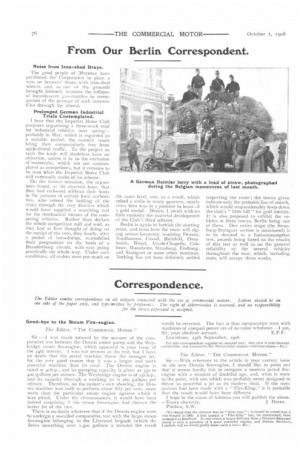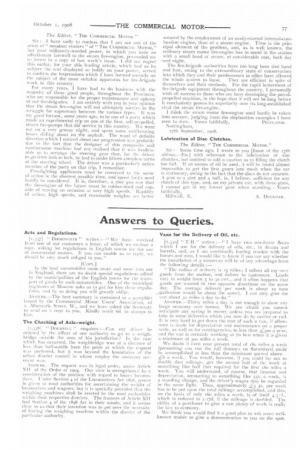Correspondence.
Page 16

Page 17

If you've noticed an error in this article please click here to report it so we can fix it.
Tier Editor invites correspondence on all subjects connected with the use of commercial motors. Letters should be on one side of the paper only, and 1,,vpe-written by preferenc... The right of abbreviation is reserved, and no responsibilsty for the views expressed is accepted.
Good-bye to the Steam Fire-engine.
The Editor, " THE COMMERCIAL MOTOR."
Sir :-1 was much amused by the account of the comparative test between the Dennis motor pump and the Weybridge steam fire-engine, which appeared in your issue of the 24th instant. I was not present at the test, but I have no doubt that the petrol machine threw the stronger jet, for the very good reason that it was a larger and more powerful machine than its rival. The Dennis engine is rated at 4oh.p., and its pumping capacity is given as 350 to :too gallons per minute. The Weybridge engine is of zsi.h.p., and its capacity through a working jet is 260 gallons per minute. Therefore, on the maker's own showing, the Dennis machine was built to perform about fifty per cent, more work than the particular steam engine against which ii was pitted. Under the circumstances, it would have been indeed surprising if the steam fire-engine had thrown the better jet of the two.
There is no doubt whatever that if the Dennis engine were to undergo a so-called comparative test with the large steam fire-engine belonging to the Liverpool brigade (which delivers something over 1,500 gallons a minute) the result would be reversed. The fact is that comparatiye tests with machines of unequal power are of no value whatever.-I am,
Sir, your obedient servant, E . P. F., Lewisham, 25th September, Igo&
Yet this correspondent suggests an unequal test Our view is that internalemohustion—not necessarily the Dennis-type engine—will beat steam.—ED.]
The Editor, "THE COMMERCIAL MOTOR."
Sir :—With reference to the article in your current issue on the new Dennis fire-engine, I should like to point out that it seems hardly fair to compare a modern petrol fire. enginewith a steamer of doubtful age, and, what is more to the point, with one which was probably never designed to throw as powerful a jet as its modern rival. If the comparison had been made with a " Fire-King," it is probable that the result would have been different.
hope in the cause of fairness you will publish the above. —Yours sincerely, J. DINES. Pimlico, S.W.
I We stated that the steamer was an "older type"; it should he noted that it was bought in 11105, A test against a " FirmKum " has, we understand, heen arranged at Bradford. In any event, a larger delivery from a GwynnmElargeant pump is only a question of a more powerful engine, and Dennis Brothers, Limited, will no doubt gladly make such a test.—ED.1 The Editor, " THE COMMERCIAL MOTOR.
Sir have sadly to confess that I am not one of the
army of " constant readers " of " THE COMMERCIAL MOTOR," but your militantly-worded poster, in which you bade an xiffectionate farewell to the steam fire-engine, persuaded me to invest in a copy of last week's issue. I did nut regret-this outlay, for your able leading article, which had as its subject :he text displayed so boldly on your poster, served to confirm the impressions which I have formed recently on the subject of the most suitable apparatus for fire-brigade work in this country.
For many years, I have had to do busines‘, with the majority of those good people, throughout the Provinces, who are responsible for the proper maintenance and upkeep of our fire-brigades. I am entirely with you in your opinion that the steam fire-engine will not ultimately survive in the struggle for supremacy between the various types. It was my good fortune, some years ago, to be one of a party which made an experimental trip on one of the first, self-propelled, steam fire-pumps that did service in this country. We went Gilt on a very greasy night, and spent some exhilarating hours sliding about on the asphalt. The want of definite direction which I noticed about our progression was probably due to the fact that the designer of this composite and cumbersome machine had not realised that it was inadvisable so to arrange the steering gear that, for the driver to go from lock to lock, he had to make fifteen complete turns of the steering wheel. The driver was a particularly active member of the party on that trip, I remember.
Fire-fighting appliances must be conveyed to the scene of action in the shortest possible time, and speed limits need hardly he considered. It is, therefore, a sine pa non that the tire-engine of the future must be rubber-tired and capable of moving on occasion at very high speeds. Rapidity of action, high speeds, and reasonable weights are better
secured by the employment of an easily-started internal-combustion engine, than of a steam engine. Time is the principal element of the problem, and, as is well known, the ordinary steam motor tire-engine has to stand in the station with a small head of steam, at considerable cost, both day -find night.
The fire-brigade authorities have too long been tied hand and foot, owing to the extraordinary state of conservatism into which they and their predecessors in office have allowed the whole system to lapse. They are efficient in spite of themselves and their methods. For the rapid betterment of lire-brigade equipment throughout the country, I personally wish all success to those who are busy developing the petrolpropelled machine, in the hope that it will not be long before it conclusively proves its superiority over its long-established rival the steam lire-engine.
I think the steam motor fire-engine need hardly be taken into account, judging from the elephantine examples I have seen to date. Yours faithfully, PECUI.ATOR. Nottingham, 27th September, 1908.
Lubrication of Disc Clutches.
The Editor, " THE COMMERCIAL MOTOR."
Sir : Some time ago, I wrote to you [Issue of the 17th ultimo.—End with reference to the lubrication of disc clutches; but omitted to add a caution as to filling the clutch too full. If an excess of oil be used, it will be found almost impossible to get the first gears into mesh when the car is stationary, owing to the fact that the discs do not separate. A pint to a pint and a half, is, I believe, sufficient for any clutch of this type, and, on my private car, with three pints, I cannot get in my lowest gear when standing.—Yours faithfully, E. A. Ductoliud.




















